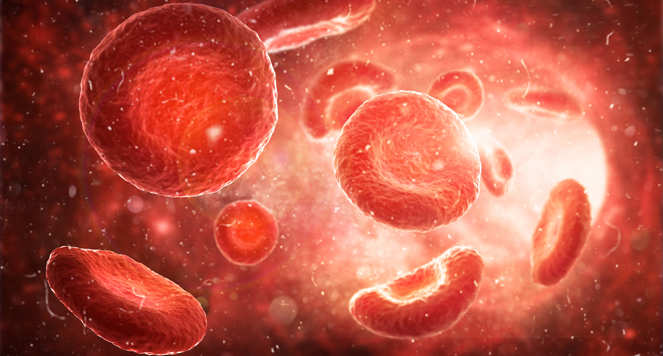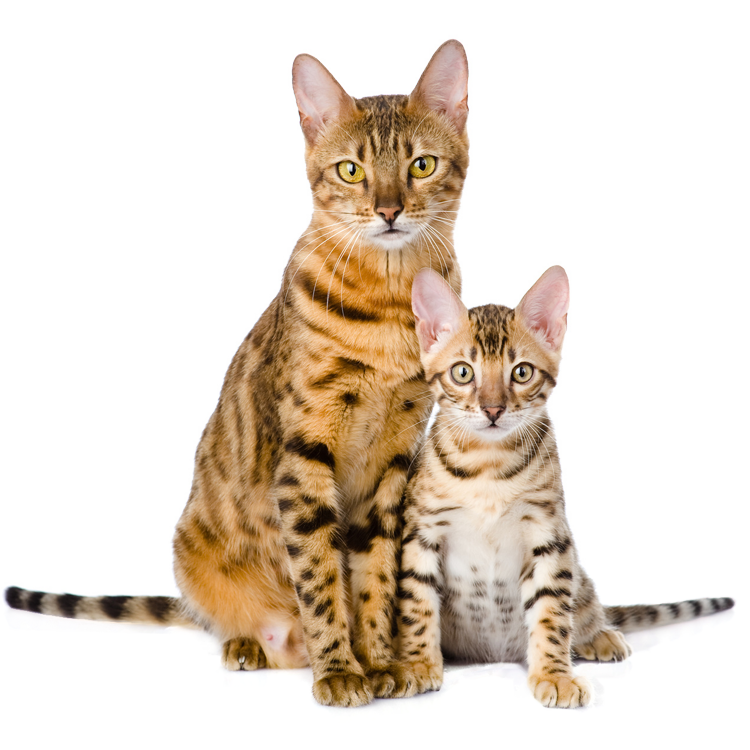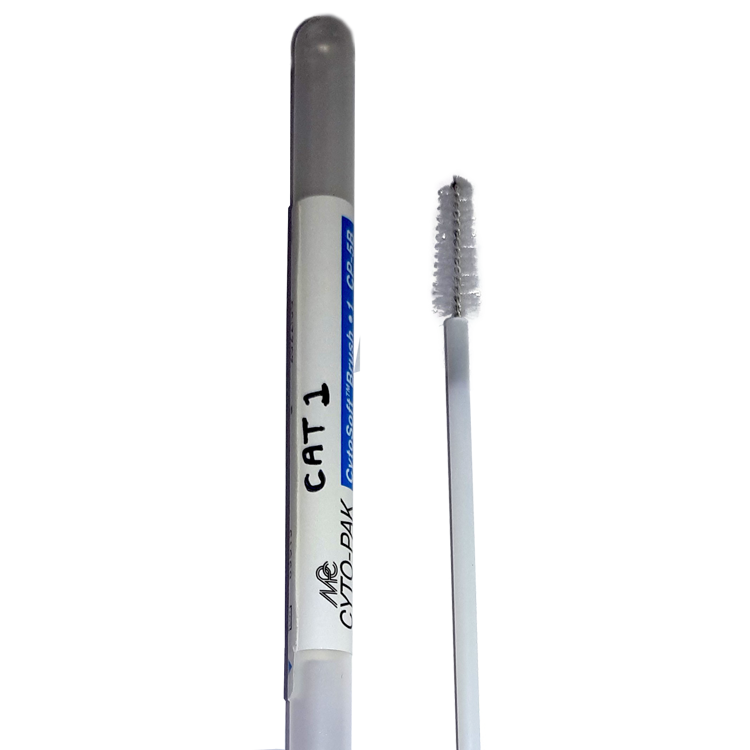Background
The presence of naturally occurring (i.e. without the need for a previous blood transfusion), high titre antibodies to type A blood in type B cats can cause neonatal isoerythrolysis (NI), a bursting of the red blood cells.
This can occur when a type B queen is bred to a type A tom. Any type A kittens produced from the mating will absorb the anti-type A antibodies in their mother’s colostrum during the first day of life, and these antibodies can mediate haemolysis (bursting) of the kitten’s type A red blood cells, which can be lethal. It is therefore important for breeders to test the blood type of breeding queens, allowing them to identify the risk of NI. Additionally, the genetic test can identify cats that carry one b allele whereas serological blood typing cannot identify carriers of b.
Cats have one common blood group with three blood types: type A, type B and the rarer type AB. The following nomenclature is used to define blood type alleles/variants:
- A for blood type A
- a or sometimes c for blood type AB
- b for blood type B
Please note: the rare AB blood type is not the result of one copy of the A allele and one copy of the b allele; it is a separate blood type reported to be present in less than 1% of cats. The genetics of blood type AB are not well understood.
About our tests
Blood type (All breeds) - previously this test was called Feline Blood type
Our genetic test for Blood Type (All breeds) identifies two recessive b alleles that are associated with type B blood in all breeds* of cat. Professor Leslie Lyons’ research team discovered the original mutation in the cytidine monophospho-N-acetylneuraminic acid hydroxylase
(CMAH) gene associated with B blood type (termed b1).
Later, our research identified a further mutation, termed b2 (previously reported as ‘unusual genotype’), that also appears to be linked to blood type B in cats. The b2 mutation is rare but has been observed in cats from the UK, Mainland Europe and the USA in several breeds including
Bengal, BSH, Devon Rex, Egyptian Mau, Ragdoll, Siberian and Turkish Van.
By including these two mutations together in our Blood type (All breeds) test the accuracy is ~97% at predicting b blood type in pure breed cats. In about 3% of cats the genetic results from this test do not match the conventional blood typing results, indicating that there are additional
mutations yet to be identified.
*Some breeds do not have the b allele (Siamese, Burmese, and Oriental Shorthair).
Blood type b3 (Ragdoll and related breeds)
Recently, we have added this new test to identify a newly discovered third recessive type b allele, associated with B blood type in Ragdolls and related breeds plus Scottish Folds.**
Please note: it is recommended that breeders of Ragdoll, Ragamuffin and Scottish Fold cats test for both the Blood type (All breeds) and the Blood type b3 (Ragdoll and related breeds) tests in order to get a complete blood type result. This combined result is reported as ‘Feline Blood
Group’. Any submissions from these breeds for just Blood type (All breeds) will be contacted and encouraged to add the Blood type b3 test.
If only the Blood type (All breeds) test is run on these breeds then the accuracy of the blood type results reported is significantly reduced and should not be used for breeding compatibility decisions.
** This is a newly discovered mutation, as more data is gathered about this mutation it may be found in breeds other than those listed. We will update our testing advice accordingly.
What are the genetics of cat blood types?
During red blood cell development, the ‘B’ form of neuraminic acid is converted to the ‘A’ form by the enzyme cytidine monophospho-N-acetylneuraminic acid hydroxylase (CMAH).
Mutations in the CMAH gene disrupt this enzyme activity and result in the presence of different neuraminic acid residues on the surface of red blood cells. Type A cats have the ‘A’ form of neuraminic acid, type B cats have the ‘B’ form of neuraminic acid and type AB cats have both forms.
Blood type A is dominant to blood type B, meaning that two mutated copies of the b allele (whether the same or different eg b1/b1 or b1/b3) are required for a cat to be type B; i.e. one allele from the tom and one from the queen. Cats with only one copy of any b allele can be blood type A or type AB. Our genetic tests cannot distinguish between blood type A and type AB.
The mutations causing blood type AB in most cats are unknown, although they are thought to be recessive to type A and dominant to type B.
The naming system of the blood types can be confusing as the rare AB blood type is not genetically equivalent to having one copy of the type A gene and one of the type B gene, it is a separate blood type (sometimes called Type C) reported to be present in less than 1% of cats, but more common in Ragdolls (18%).
Why is blood type important?
Cat breeders want to avoid a condition called Neonatal Isoerythrolysis (NI) or ‘fading kitten syndrome’. NI typically happens when blood type A or AB kittens are born to a blood type B queen.
Blood type A cats usually have naturally occurring, low titre antibodies to type B blood.
Blood type B cats usually have naturally occurring, high titre antibodies to type A blood.
The presence of these naturally occurring (i.e. without the need for a previous blood transfusion), high titre antibodies to type A blood in type B cats can cause neonatal isoerythrolysis (NI).
As type B queens usually have high levels of anti-A antibodies in their blood, which are secreted into their colostrum (the first bit of milk produced by the female when the kittens are first born, which is rich in antibodies) all their kittens get a high dose of anti-A antibodies when they suckle. These antibodies will bind to the type A or AB red blood cells of any kitten that is not blood type B, causing the cells to burst creating severe anaemia which can be fatal.
The reverse scenario of a type A or AB queen giving birth to type B kittens rarely results in NI because type A queens usually have low levels of anti-B antibodies in their blood, and these antibodies rarely cause anaemia in the type B kittens.
The number of kittens affected will depend on the genotype of the tom.
- If a blood type A or AB (does not carry b) tom, is mated to a blood type B queen, then all of the kittens will be blood type A or AB (carrier of b) and therefore all at risk of NI.
- If a blood type B queen is mated to a blood type A or AB (carrier of b) tom then each kitten will have a 50% chance of being blood type B and a 50% chance of being A or AB (carrier of b). Any A or AB (carrier of b) kittens born will be at risk of NI.
Severity of disease with NI will depend on the amount and nature of the antibodies produced by the queen and absorbed by the kitten; large amounts of highly agglutinating antibodies will cause the most severe disease. Unfortunately, we are not able to determine the amount and nature of the antibodies produced by a type B queen.
Interpretation of results
Cats with two copies of any b allele, whether the same or different, have type B blood. Cats with only one copy of any b allele (carrier of b) can be blood type A or type AB.
Please Note: Our genetic blood type tests cannot distinguish between blood type A and type AB. The AB blood type is rare in most breeds of cat but has been reported to be more common in Ragdolls (~18% prevalence).
Blood Type (All Breeds) - tests for the presence of b1 and b2
Genetic Result |
Interpretation |
Blood type A or AB (does not carry b) |
Cat has blood type A or AB |
Blood type A or AB (carrier of b1) |
Cat has blood type A or AB |
Blood type B (b1/b1) |
Cat has blood type B |
Feline Blood Group - combined result of Blood Type (All Breeds) and Blood Type b3 (Ragdoll and related breeds). Tests for the presence of b1, b2 and b3
Genetic Result |
Interpretation |
Blood type A or AB (Does not carry b) |
Cat has blood type A or AB |
Blood type A or AB (Carrier of b1) Blood type A or AB (Carrier of b2) Blood type A or AB (Carrier of b3) |
Cat has blood type A or AB |
Blood type B (b1/b1) Blood type B (b1/b2) Blood type B (b1/b3) Blood type B (b2/b2) Blood type B (b2/b3) Blood type B (b3/b3) |
Cat has blood type B |
How do I select a safe blood type pairing for breeding?
Blood type A or AB Males |
Can be mated to Females that are: - Blood type A or AB (does not carry b)
|
Blood type B Males |
Can be mated to Females that are: - Blood type A or AB (does not carry b) |
Blood type A or AB Females |
Can be mated to Males that are: - Blood type A or AB (does not carry b) |
Blood type B Females |
Can be mated to Males that are: - Blood type B
We do NOT recommend breeding to Males that are: - Blood type A or AB (does not carry b) This can cause neonatal isoerythrolysis. |
Frequently Askes Questions
Can I breed from a blood type B queen?
Blood type B queens should be bred to blood type B toms to prevent NI in the kittens. In this situation all the kittens born will be blood type B and not at risk of NI.
If a blood type B queen is mated to a blood type A or AB tom then the kittens will need to be removed from the queen at birth and hand reared for the first 24-48 hours so that they do not suckle the colostrum and get the high dose of anti-A antibodies that can cause NI. After this time the kittens will be safe to return to the queen to continue suckling as normal.
I’ve been told that NI can’t happen in the first litter, only in subsequent litters?
A common misunderstanding about NI is that it cannot happen in a queen’s first litter of kittens, i.e. a type B queen has to be exposed to type A blood to raise the anti-A antibodies. This is incorrect since type B queens have naturally occurring high levels of anti-A antibodies in their blood regardless of the number of litters they
have had.
Therefore, NI can occur in the kittens from the first litter of a type B queen. Whilst most type B queens have high levels of anti-A antibodies in their blood, the levels do vary and some type B queens may produce lower levels. This may be responsible for some cases where type B queens appear to have litters with no apparent NI issues.
What does this mean for breeding?
Blood type A is dominant to B. Cats with type A can be A/A, A/a or A/b and cats with type B are always b/b.
Blood type A is common among cats but the frequency varies significantly by breed and geographic location.
Breeds that do not have the b allele are Siamese, Burmese, and Oriental Shorthair. Breeds with high incidence (up to 60%) of the b allele are Exotics, British Shorthair, Cornish Rex and Devon Rex.
Are there any breeds that can’t be tested?
No, all breeds can be tested. The tests have been validated for domestic cat breeds only. The accuracy of results for wildcats and hybrids (Savannahs, Bengals, Chaussies) has not been determined by comparison
to serological testing.
Do I need to have my cat blood sampled for the test?
No. We can use either a mouth swab or 0.5ml of EDTA anticoagulated blood to carry out these tests.
I own a Ragdoll, Ragamuffin or Scottish Fold that has previously been tested by you for Feline Blood type, can I add on the new test Blood type b3 (Ragdoll and related breeds)?
I’m a Ragdoll/related breeds/Scottish Fold breeder, why do I have to test for both the Blood type (All breeds) and the Blood type b3 (Ragdoll and related breeds) tests?
Both the Blood type (All breeds) and Blood type b3 (Ragdoll and related breeds) tests are required to ensure that an accurate blood type result is obtained. If a Ragdoll/related breed or Scottish Fold cat is only tested for the Blood type (All breeds) test there is the potential for the wrong blood type result to be reported.
If the cat has been reported as Blood Type B, then the blood type result is complete and the b3 test is not required.
However, if the previous blood type result reported was not blood type B, the cat could have one or two copies of the b3 allele which could change their blood type. We strongly recommend additionally testing for Blood Type b3(Ragdoll and related).
This is especially important for female cats to ensure that blood type B females are not accidently bred to blood type A or AB males, risking Neonatal Isoerythrolysis in the kittens.
Why do we tests blood type in cats?
All blood transfusions between cats require blood types to be matched, otherwise fatal transfusion reactions can occur. Blood typing for transfusion can safely be carried out using serological (non-genetic) methods. However, for breeders the main concern regarding blood types is identifying blood type B cats, in particular breeding queens. To be blood type B, a cat must have two copies of a recessive b allele. Genetic
testing has an advantage over serological testing because it can identify blood type A or AB cats that have one copy of a b allele (termed carrier of b). These cats would be reported as type A by conventional (serological) blood typing methods, which cannot detect the carried b allele, but mating two such cats together can result in blood type B kittens being born. This is not a risk to the kittens when born but can affect future mate compatibility when breeding from them in the future.
Click here to download -



